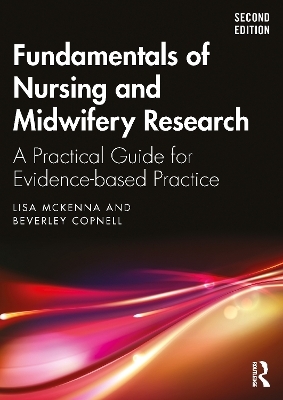
Fundamentals of Nursing and Midwifery Research
Routledge (Verlag)
978-1-032-53953-9 (ISBN)
This book presents a unique approach to teaching the principles of health research using practical case studies with which nurses and midwives can engage to gain the skills to read and understand reports, evaluate the quality of research, synthesise different studies and be able to evaluate their effectiveness when applied to clinical practice.
The book covers core concepts and principles, including the following:
What evidence is and why understanding research is vital
Finding reliable sources of evidence
The nature of the research process
Understanding quantitative and qualitative research
Ethical considerations
Using research to guide clinical practice
Throughout the book, activities, summaries and review questions help ground theory in real-life scenarios, showing how evidence-based practice can be applied in every aspect of nursing and midwifery care. It is designed for nurses and midwives, from those just beginning their studies to qualified practitioners undertaking their first research projects.
Lisa McKenna is Professor and Dean in the School of Nursing and Midwifery, La Trobe University, Melbourne. She has researched widely, particularly in the areas of nursing, midwifery and health professional education and workforce, and published over 250 refereed peer-reviewed journal articles along with a number of textbooks. Lisa’s research expertise incorporates a range of methodologies, including quantitative, qualitative and mixed methods. Beverley Copnell is Associate Professor in the School of Nursing and Midwifery, La Trobe University, Melbourne. Before entering academia, she worked in paediatric intensive care, a field in which she maintains an active interest. She is a member of the editorial board of Pediatric Critical Care Medicine and an editor of Collegian: The Australian Journal of Nursing Practice, Scholarship and Research. She has a long-standing interest in promoting research and evidence-based practice in nursing.
Section 1 How Do I Find and Use Evidence? 1.What is evidence and why do I need to understand research? 2.Locating evidence. Section 2 How Can I Make Sense of Research Evidence? 3.Understanding how research is done. 4.Understanding quantitative research approaches. 5.Understanding qualitative research approaches. Section 3 How Do I Critically Evaluate Research Studies? 6.Critiquing research. 7.Ethics and research in nursing and midwifery. Section 4 How Do I Use Research Evidence to Inform My Practice? 8.Applying evidence in practice. 9.Writing effective reviews of literature. 10.Sharing Research. Section 5 How Do I Pursue a Nursing or Midwifery Research Future? 11.Research pathways for nurses and midwives.
| Erscheinungsdatum | 02.02.2024 |
|---|---|
| Zusatzinfo | 12 Tables, black and white; 4 Line drawings, black and white; 4 Illustrations, black and white |
| Verlagsort | London |
| Sprache | englisch |
| Maße | 174 x 246 mm |
| Gewicht | 400 g |
| Themenwelt | Sachbuch/Ratgeber ► Gesundheit / Leben / Psychologie |
| Medizin / Pharmazie ► Allgemeines / Lexika | |
| Medizin / Pharmazie ► Gesundheitsfachberufe ► Hebamme / Entbindungspfleger | |
| Medizin / Pharmazie ► Medizinische Fachgebiete ► Pädiatrie | |
| Pflege ► Studiengänge ► Pflegewissenschaft | |
| ISBN-10 | 1-032-53953-4 / 1032539534 |
| ISBN-13 | 978-1-032-53953-9 / 9781032539539 |
| Zustand | Neuware |
| Informationen gemäß Produktsicherheitsverordnung (GPSR) | |
| Haben Sie eine Frage zum Produkt? |
aus dem Bereich


